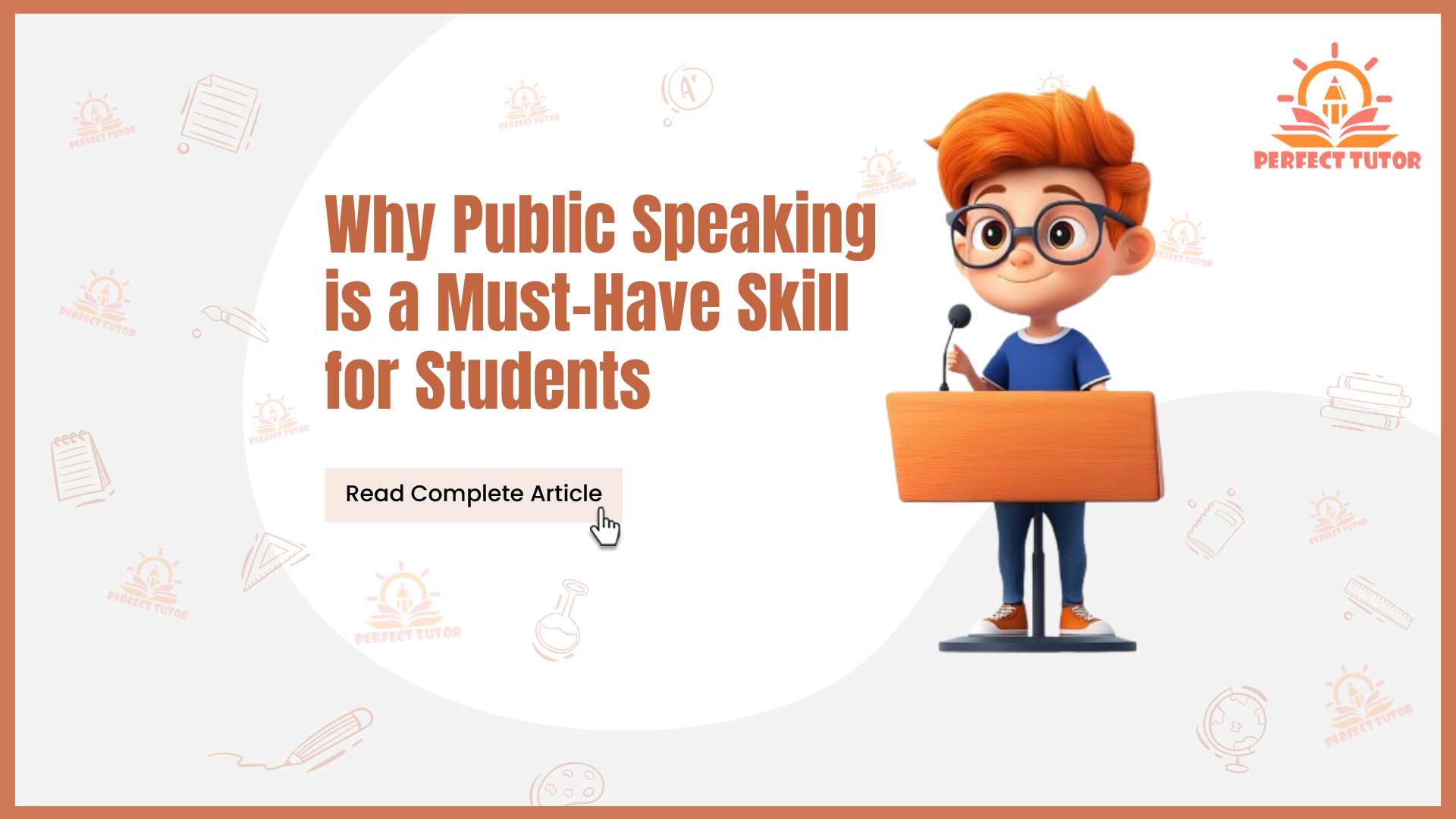Why Public Speaking is a Must-Have Skill for Students
Think about the last time a student had to speak in front of the class, maybe during a presentation, a debate, or even answering a simple question. For many, the experience comes with sweaty palms, a racing heart, and the urge to sit down as quickly as possible. Public speaking isn’t always easy, but it’s a skill that can truly change a student’s life.
In a world that values communication more than ever, public speaking is no longer just a “nice-to-have” skill; it’s important. Whether students dream of becoming doctors, entrepreneurs, teachers, or artists, the ability to clearly express thoughts in front of others can set them apart. It’s a skill that can be learned and improved over time, just like riding a bike or solving math problems.
1. Builds Confidence
One of the biggest and most immediate benefits of public speaking is increased self-confidence. When students learn to speak up, whether it's during a group discussion or a school assembly, they start to believe in their voice. That belief carries over into other areas of life.
The first few attempts might feel awkward or even scary. But with every small win, like getting through a presentation without stumbling or answering a tough question, their confidence grows. These small moments add up and help students feel more comfortable being themselves in front of others.
2. Improves Communication Skills
Public speaking is just about sharing your thoughts in a way others can understand. When students practice speaking in front of others, they naturally get better at organizing their ideas. Instead of feeling jumbled or lost, they learn how to put things into clear sentences that make sense.
It’s not just about talking, it’s also about listening. Good communication is a two-way street. When students speak in class or give presentations, they also become more aware of how others respond. This helps them learn when to pause, how to explain something differently if people look confused, or how to answer questions.
These communication skills don’t just help in school assignments. They make everyday conversations easier, whether it’s chatting with friends, explaining something to a family member, or working on a group project. Over time, students feel more comfortable speaking up and sharing their ideas because they know how to get their point across.
3. Prepares for Real-World Challenges
Speaking confidently in front of people isn’t just something you need in school; it’s a skill you’ll use throughout your entire life. Think about job interviews, team meetings, or even sharing your ideas with friends or family. Being able to express yourself clearly and confidently makes all of these moments easier.
When students practice public speaking early on, they’re preparing for these real-world situations. It’s like training for a sport—the more you practice, the more comfortable and ready you feel when it counts.
When you can talk well, people listen. Whether it’s convincing a teacher, leading a project, or even standing up for yourself, good speaking skills help you be heard and taken seriously. That kind of confidence opens doors in college, careers, and everyday life.
4. Encourages Critical Thinking and Research
Good public speaking isn’t just about standing in front of people and talking. It involves preparing or thinking deeply about a topic, organizing key points, and presenting facts in a clear, convincing way.
This process helps students become better thinkers. They learn how to break big ideas into understandable parts, anticipate questions, and defend their opinions respectfully. It’s a skill that strengthens both their academic and personal reasoning.
Read This Also - Why Public Speaking is a Must-Have Skill for Students
5. Develops Emotional Intelligence
One of the underrated benefits of public speaking is how it builds emotional intelligence. When students speak to an audience, they learn to read body language, sense engagement, and adjust their tone or pace based on how others react.
This awareness of others’ feelings and reactions helps them become more empathetic and socially aware. It also improves their ability to connect with people—something that’s important in both friendships and professional relationships.
6. Enhances Leadership and Persuasion
Whether you're leading a student club, pitching a project idea, or standing up for a cause, clear communication is key to leadership. Public speaking teaches students how to influence others, not by shouting the loudest, but by speaking with purpose and conviction.
Great leaders often begin as great speakers. They inspire trust, build understanding, and bring people together through words. By learning how to speak effectively, students also learn how to lead.
7. How Schools and Parents Can Support
Like any other skill, public speaking gets better with practice. Schools and families play an important role in creating opportunities and safe spaces for students to develop this ability.
Teachers can encourage class participation, assign short presentations, or host informal speaking activities like “Show and Tell” or debates. Many schools also have drama clubs, speech competitions, or Model UN programs where students can learn to speak in front of groups.
At home, parents can help by listening without judgment, asking open-ended questions, and encouraging their children to share stories or explain their thoughts. It’s not about pushing them into the spotlight; it’s about helping them feel safe enough to shine.
8. Start Small, Think Big
Not every student wants to become a motivational speaker, and that’s okay. Public speaking doesn’t have to mean standing on a stage with a microphone. It could be confidently asking a question in class, sharing an idea in a group project, or giving a toast at a family gathering.
The goal isn’t perfection, it’s progress. Starting with small, low-pressure situations helps students slowly build their skills. Over time, those little moments of speaking up become habits, and those habits lead to big growth.
Conclusion
Public speaking might feel scary at first, and that’s completely normal. But every time a student speaks up, they’re taking a step forward not just in school, but in life. It’s about finding your voice, sharing your ideas, and connecting with others in a way that feels true to you.
The great thing is, you don’t have to be perfect. It’s okay to stumble or feel nervous; that’s just part of learning. What matters most is trying, practicing, and knowing that every small effort builds confidence and skill.
So, whether it’s answering a question in class or telling a story to your family, these moments are all practice for bigger things ahead. Public speaking isn’t just a skill for a few; it’s a gift everyone can develop, and it’s never too early or too late to start.

Please Wait...


 +91 8700847275
+91 8700847275
 +1 8009616567
+1 8009616567